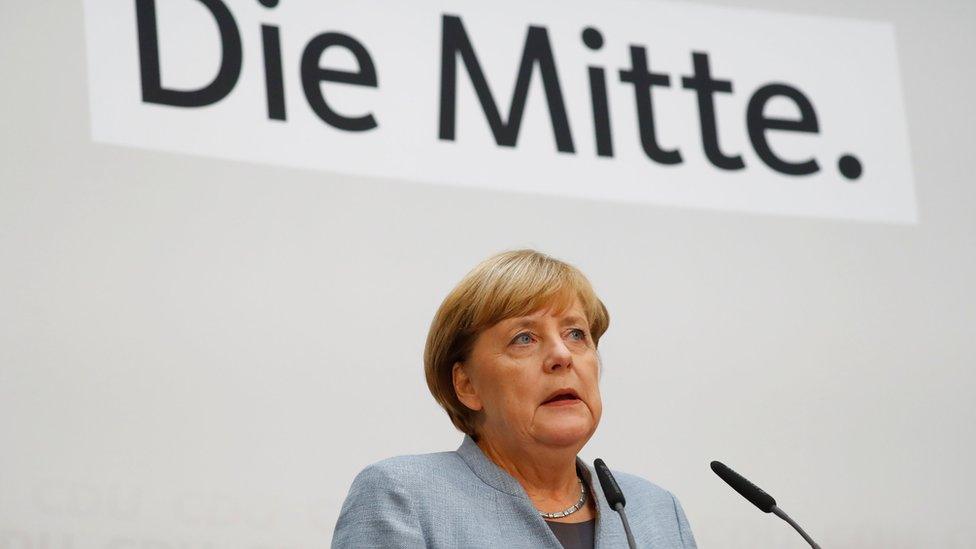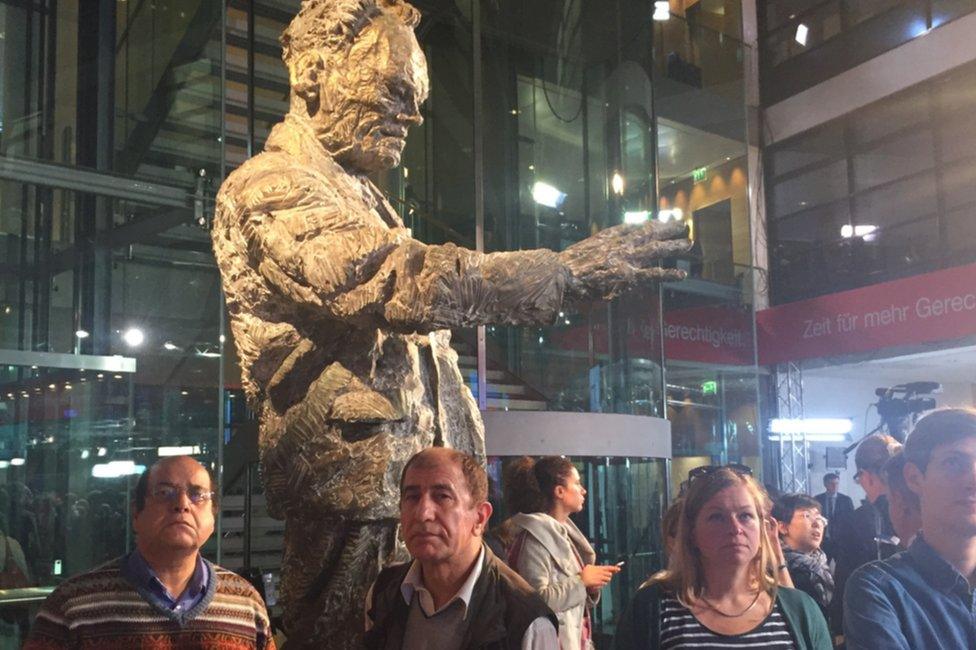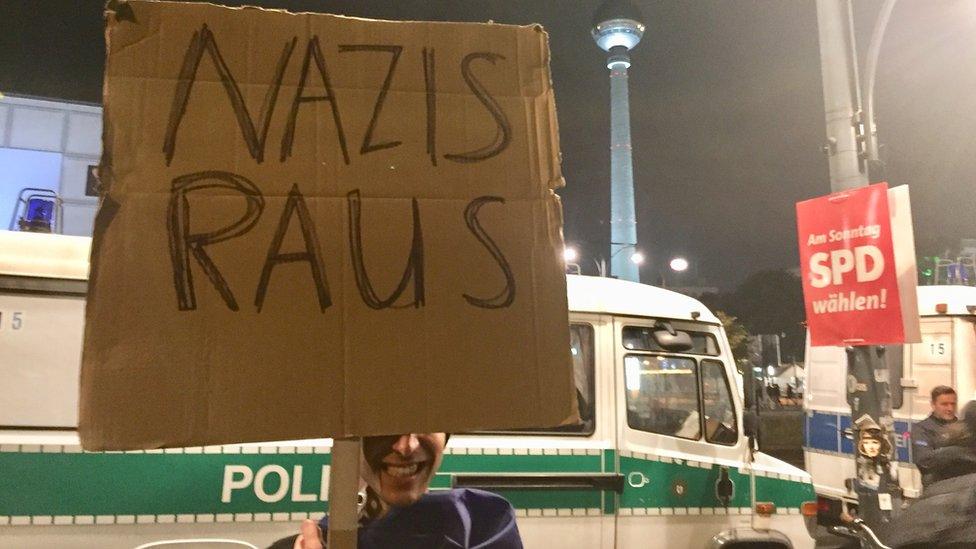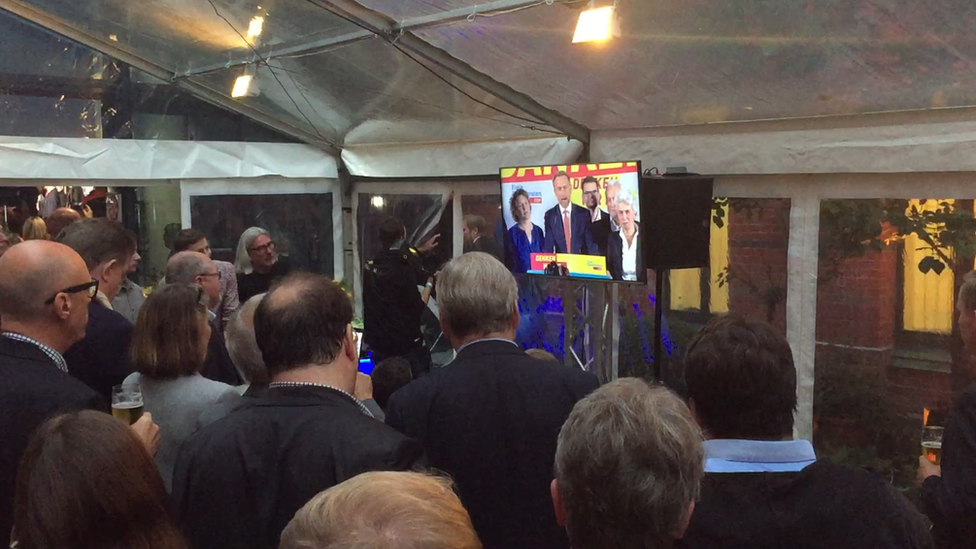Shockwaves after election in Germany
- Published

The arrival of the far right Alternative Fur Deutschland (AFD) in Germany's national parliament - the Bundestag - has sent shockwaves through the country's domestic political scene. With Angela Merkel now significantly weakened, Germany suddenly seems a different place.
The glum faces beneath the statue of Willy Brandt at the SPD headquarters said it all.
Yet another of Angela Merkel's coalition partners had suffered at the polls at the end of a term of government alongside the woman they call "Mutti".
The left of centre Social Democrats (SPD) had been in a Grand Coalition with the Christian Democrats (CDU) and were now suffering their worst electoral performance since World War Two.
"The party will fight on. We want to start over again and rebuild in opposition," one supporter told me.

Glum faces below the statue of Willy Brandt
But something else was happening which hadn't been seen since the war.
The far right was entering the Bundestag after Alternative Fur Deutschland (AFD) had come from nowhere to become Germany's third biggest party.
While some members claim the party is in fact moderate and simply reflects widely held concerns about immigration, there are plenty of examples of extremist views.
Senior AFD members have spoken about shooting refugees who are crossing the border illegally, about deporting a German government minister of Turkish origin, and have made derogatory remarks about gypsies.
The party's joint leader Alexander Garland has spoken about being proud of what German soldiers did in World War Two, and also said he would not want a black German footballer as a neighbour.

Anti-Nazi protests outside the AFD's election night party.
At Alexanderplatz in Berlin, hundreds of anti-Nazi protesters gathered outside the venue where the AFD were celebrating their election success.
One protester accepted they had been elected but insisted the AFD were outside normal political spectrum.
"They should be free to say what they have to say but it's also my right to say what they say is rubbish."
Riot police in body armour and helmets with visors kept the peace while a noisy protest went on late into the night, smashed beer bottles crunching under people's feet.
In the next German Parliament the AFD will be far from power but the successful election campaign means they are now Germany's third biggest party and they will continue to have an impact on the debate especially over migrants.
Angela Merkel, who has been chancellor since 2005, now has to try to form a coalition.
While she continues to reach out to the SPD to possibly form another Grand Coalition they have said they want to be in opposition to hold her CDU to account.
That means the most likely outcome is what is dubbed the Jamaica coalition, named after party colours, the black of the CDU, the green of Die Grunen, and the yellow of the Free Democrats (FDP) making up the colours of the Jamaican flag.
As the exit poll came through suggesting they were on 10%, the Free Democrats cheered with delight and a fair bit of relief.
Four years ago after being coalition with the CDU they had failed to make the 5% cut off and didn't get any seats.
Such a long time in the political desert makes them extremely cautious about what they might sign up to.

Christian Lindner of the Free Democrats appears on television
As FDP leader Christian Lindner passed by on his way to a TV interview I asked him if he was nervous about getting into bed with Frau Merkel given what had happened in the past.
"Mal sehen" he said, "We'll see".
A party colleague Tim Stuchtey added: "It always seems that Frau Merkel is hurting the junior partner and you don't want to make the same mistakes twice.
"From experience we know we have to have things in writing to get them through."
Also to be seen is how the Free Democrats who want to keep coal-fired power stations going to fuel German industry could coexist in government with the Greens who want them closed.
And the Free Democrats could also put a break on moves towards closer EU political and financial integration over issues such as a European Union Finance Minister, as proposed this week by President Macron of France.

Cakes were on offer at the CDU victory party
Dr Christoph Nguyen of Berlin's Freie Universitat says potential coalition partners remain pro-EU but cautious about further integration.
He said: "They will make it much more difficult for Frau Merkel to move ahead in fostering an expansive European policy."
At the CDU party they were celebrating a victory of sorts, albeit well aware that they and Angela Merkel in particular were diminished by the result.
David McAllister, half Scottish and a senior CDU member of the European Parliament, says that as a democrat he has to accept the result but is clear about one thing.
He said: "The Bundestag will not be a platform for racist, chauvinist or extreme nationalist positions.
"We have to take the concerns of AFD voters seriously and the best way to counter right wing populist propaganda is to deliver concrete results."
The cakes, fine food, beers, wine and sekt on offer at the party couldn't disguise the fact that this parliament is going to be very difficult for all concerned.